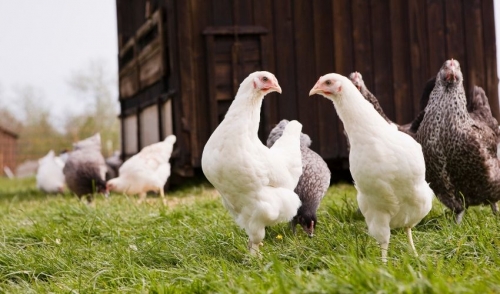
Free Range Chicken Care
Raising free range chickens can be a challenge, but it can be well worthwhile for a more robust, healthier, more productive flock. But what makes free range chickens so desirable, and what special needs do they have for their care?
What Free Range Means
When chickens or other livestock are “free range” they are allowed to roam at will, with free access to outdoor areas and fewer restrictions on their overall movements and habitat. These animals are not restricted to a small coop, barn, or pen, but instead have a much larger, more enriching space to explore. There is a wide range of interpretation for free range definitions, however, and because there are few legal regulations about what can be officially labeled as free range for chickens, different farmers, commercial agricultural operations, or urban homesteaders may consider their poultry free range in different ways. Depending on the degree of ranging the birds may do or what spaces are available to them, they may also be considered “pastured” “old-fashioned” “open-raised” or other, similar terms, but the challenges and needs for their care are the same.
Benefits of Free Range Chickens
Raising free range chickens has many benefits. Because the birds are not confined to small areas, they get greater amounts of exercise, building up more muscles and more protein in their meat than birds with restricted habitats. Free range chickens generally have lower fat content and fewer calories in their meat and eggs as well, and many consumers believe free range chickens and their eggs to have a better, richer taste. The birds’ better health helps them be more resistant to pests and disease, though they can be more susceptible to predators such as foxes and raccoons. With more room to roam, free range chickens tend to have fewer issues with anxiety, aggression, and territoriality, even with larger flocks.
The costs of caring for free range chickens can also be lower than confined flocks. Because the birds forage naturally for a wide range of foods, there is less need for expensive feed or supplemental pellets. Free range chickens will also provide natural pest control for a garden or landscape as they snap up all types of bugs and munch on weeds and seeds, and their natural pecking, scratching, and digging will aerate and till soil while their droppings become excellent fertilizer. A large flock can lead to a messy or damaged garden area, however, so be aware of that consequence before setting the birds free.
Tips for Free Range Chicken Care
Chickens cannot simply be left alone completely to their own devices, even if they are intended to be a free range flock. Responsible husbandry requires staying alert to the birds’ needs and providing adequate resources for them, and there are several steps that every potential chicken breeder or raiser will need to take to make the most of their free range chickens.
- Provide Shelter: Even free range chickens still need shelter at night and protection from poor weather. A sturdy coop should be available to the flock, or several coops can be positioned in different areas for a larger flock or to allow the birds a greater choice.
- Maintain the Pasture: If chickens roam through a pasture or garden, the space should be safely maintained. Dangerous or toxic plants should be removed, fencing should be secured to keep out predators, and chemical use should be minimized to prevent contamination.
- Provide Supplemental Food: Free range chickens will forage on their own, but providing supplemental feed can ensure good nutrition as well as provide essential vitamins for a healthy flock. Feed can also be used to train and lure chickens to return to the coop at night for safety.
- Offer Enrichment: All animals, even free roaming chickens, need some mental stimulation to stay alert and healthy. Providing toys, perches, and different plants throughout the chickens’ space will increase their enrichment for sharp reflexes and better activities.
- Offer a Range of Plants: No matter where chickens are ranging, they need access to a variety of suitable plants for foraging. Different flowers, grasses, clovers, trees, and shrubs will provide extra stimulation and a better nutritional base for a healthier flock.
- Discourage Predators: Stray dogs, feral cats, and wild predators such as foxes, raccoons, weasels, and other animals can quickly decimate a free range chicken flock. Take steps to protect the birds with secure shelter, strong fences, and other tactics to keep predators at bay.
- Protect Chicken-Free Areas: If some parts of the property, such as a delicate herb garden, special flower beds, or young berry bushes, are not meant for chickens, use fencing, wire covers, or other methods to keep the birds safely away to minimize damage from beaks and talons.
- Keep Vaccinations Current: Free range chickens are more likely to come into contact with other wildlife, ticks, or insects that might transmit infections. Keeping the birds up-to-date on vaccination and wormers will keep the entire flock healthier.
- Interact With the Flock: Because these birds are less confined, they may be less sociable to human presence than more restricted chickens. Make sure the birds can recognize you, as well as your gestures and voice, so they will be familiar and at ease when you are nearby.
Every free range chicken flock is different, and it may take time to determine exactly what works best for your birds. By keeping their best interests in mind and providing a safe, suitable habitat for them to explore, however, your chickens will be free to reach their peak potential even while they’re free to roam.
